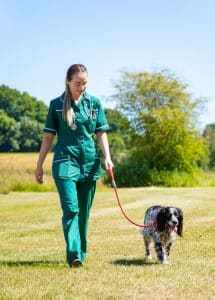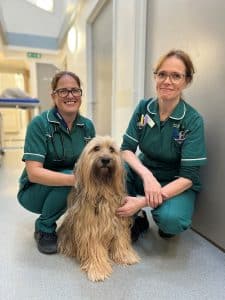
You and your pet have been referred to the Oncology service at NDSR. There are 8 of us in the team, supported by over a hundred people across the wider hospital. Our aim is to design and deliver a bespoke treatment plan for every cat or dog who comes to see us. This can mean very different things for different pets and carers.
The following information is to introduce the team members to you, as well as walking through the process of a visit to us. We know that no-one wants to have to come and see us and that it can be a very emotional, sad and concerning time. Everyone handles this differently – so please let us know if there is anything that we can do to help you or your pet.
What will happen? Your initial appointment
An initial appointment is 1 hour long. We use this time to assess your pet’s condition and find out your expectations and wishes as to what happens next. We do not need to use the whole hour or we can use more if needed.
Before the appointment, we will review all the information sent to us by your practice. When you arrive, we will then:
- Ask you questions about what has led to this point. We can learn a lot from this and it is important for us to hear in your own words how your cat or dog is feeling and behaving.
- Examine your pet. This may be very minimal or avoided completely if they are very nervous.
- Discuss the options. We understand that some people like a lot of details whereas others may prefer only to hear our tailored recommendation. There will often be several options, including only palliative treatment. There is no pressure to go ahead with any particular option and, if appropriate, you can go home and think about things. We will provide a written breakdown of the options if this is helpful.
- From there, we will start to formulate the ongoing plan. This could be admission to the hospital on the same day for more tests or treatment. This may require your cat or dog to be sedated which is why we ask for them not to have had any food that morning if it is safe to do so. It may not always be possible to have investigations on the day of the appointment, so your pet may stay overnight or be admitted another day. We may also consider starting treatment as an outpatient that day or to go home and consider what to do next.
- After the initial visit, we will call with any outstanding results and communicate our findings and opinions to you and your vets. Your pet may be booked for surgery, or other diagnostics with us. The ongoing management might be with us at NDSR or could be at your referring vets. We are very happy to provide ongoing care and support as best as possible even if you aren’t coming back to us.
- Finding the best plan for treatment requires strong communication between us. We know that everyone has different preferences for how to do so- we’re happy to talk in person, phone, email or video call as you prefer and as needed.
Surgery
Many, although not all cancers, can be cured or effectively managed with surgery. We have an amazing team of soft tissue surgeons who work closely with us. Surgery usually involves an admission into the hospital the night before or the morning of the surgery (in which case we will ask you to withhold breakfast, but water is okay). Depending on the surgery, your dog might be sent home the same day, the next day (most common), or after a few days. The hospitalisation is either to monitor the initial success of the surgery or more commonly to administer pain relief in a way which cannot be done at home.
Chemotherapy
We administer many different types of chemotherapy, some injections and tablets. The format of a chemotherapy appointment is a check that your pet is well and the cancer is responding as we expect, followed by blood tests and then administration of the drug. This process can take from 30 minutes to a few hours depending on the type of medication. We have another booklet detailing more about how and why we use chemotherapy.
Electrochemotherapy
We are pioneers of electrochemotherapy treatment in the UK and this is an effective treatment for many types of cancer. It is administered with the aid of a short general anaesthetic and on an outpatient basis. Treatment may be repeated two weeks later and we always like an update, with photos if you can, from you a week after treatment – either by phone or at oncology@ndsr.co.uk.
What is best for your pet
Our aim is to work out the best treatment plan for you and your pet. This may be done on the first visit or may take several. You are a very important part of this process and please let us know if you think that there could be anything that we do differently.
The Oncology team
We have a team of 8 people (vets and nurses) who are all committed to providing our goal of delivering the best treatment plan for you and your pet. You might meet only one of us……or could meet all of us! We work very collaboratively and are always seeking each other’s opinion and learning from each other.
Your appointment will usually be booked with one of our vets. Our resident and intern vets will always be closely supervised by a specialist vet. Our nurses are the linchpins of the team, who administer chemotherapy, care for inpatients and often admit and discharge patients from the hospital.
We all work to make sure your pet’s visit is as stress free as it can be – whether by bribing them
with treats or knowing that they don’t like to be touched on their sensitive paws.
Arranging a referral for your pet
If you would like to refer your pet to see one of our Specialists please visit our Arranging a Referral page.

